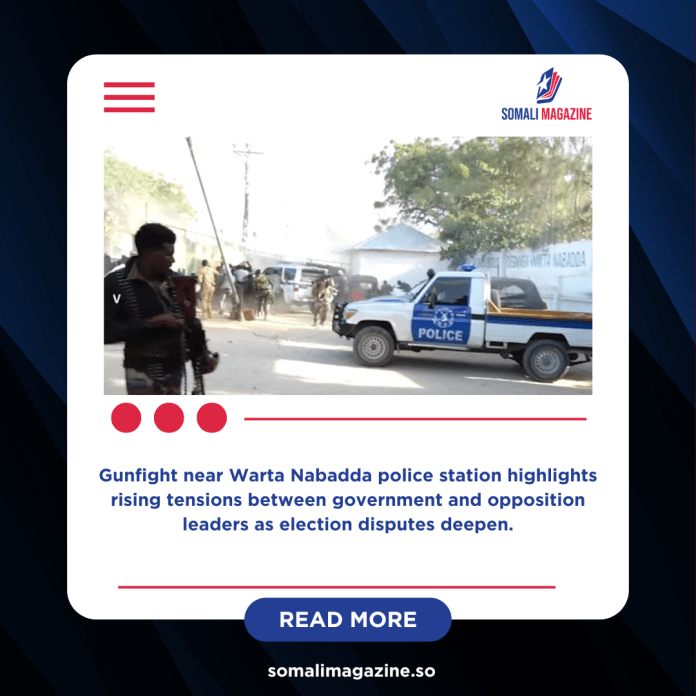Facebook Twitter (X) Instagram Somali Magazine - People's Magazine
Tensions in Mogadishu boiled over on Wednesday when Somali police clashed with opposition forces outside the Warta Nabadda district police station, leaving people injured, including members of the security forces, opposition fighters, and civilians. Witnesses described the confrontation as one of the most serious outbreaks of violence between the government and its political rivals in recent months.
The trouble began earlier in the day when opposition leaders, among them former President Sharif Sheikh Ahmed, former Prime Minister Hassan Ali Khaire, and opposition politician Abdirahman Abdishakur, arrived at the Sinai Market in Mogadishu. The market had been the site of complaints from residents that government troops were harassing civilians. Their arrival quickly drew attention and escalated tensions.
Soon after, heavy gunfire erupted near the Warta Nabadda police station. Both government forces and opposition fighters exchanged fire using small arms and heavier weapons. The fighting lasted several minutes, causing panic in the surrounding area. Stray bullets even struck inside police holding cells, where detainees were being kept, further highlighting the dangerous unpredictability of the clashes.
Authorities have yet to release official figures on the number of dead and wounded. But accounts from residents and preliminary reports suggest that the violence caused significant casualties among all sides — government security personnel, opposition fighters, and innocent bystanders caught in the crossfire. Shops near the market quickly shuttered, and residents fled the area as the sound of gunfire spread fear through the neighborhood.
In the aftermath of the fighting, the federal government issued a strong statement condemning the opposition leaders, accusing them of orchestrating an armed attempt to seize control of the police station. “The Government of Somalia regrets that politicians who aspire to seize power in the country are attempting to shed the blood of the people and the Armed Forces engaged in defending the country and fighting terrorism,” the statement read. The government placed the blame squarely on the shoulders of opposition figures, charging them with undermining security, destabilizing order, and weakening the rule of law at a time when the country is facing major threats.
Opposition leaders, meanwhile, argue that they have been standing up for the rights of ordinary citizens who have complained of mistreatment by the security forces. Their presence at the market, they said, was meant to demonstrate solidarity with the public. But the eruption of gunfire around them has fueled fears that political disputes in Somalia are increasingly spilling over into violence, with ordinary citizens paying the price.
The incident underscores the deepening political rift between President Hassan Sheikh Mohamud’s administration and opposition leaders. The two sides have been at odds over how Somalia’s next elections will be conducted, with opposition figures expressing concerns about fairness and transparency. Tensions have been building for months, and the gun battle in the streets of Mogadishu reflects how fragile the political climate has become.
For many Somalis, the violence is a troubling reminder of the country’s painful history of conflict, where disputes among political elites too often turn deadly. Residents in Mogadishu are growing increasingly anxious that such clashes could escalate further, plunging neighborhoods into instability at a time when the government is also battling al-Shabab militants across the country.
The clashes at Warta Nabadda police station have left Mogadishu on edge. With both sides digging in, the violence has fueled concerns that political rivalries could drag the capital into further bloodshed if dialogue and compromise are not urgently pursued. Ordinary citizens, once again caught between armed groups, are left to cope with the fear and uncertainty of a conflict that shows little sign of easing.

